"Given the level of barbarism, it is unsurprising that Syria remains the world’s worst humanitarian crisis."
Statement by Ambassador Matthew Rycroft of the UK Mission to the UN at the Security Council Open Debate on the Middle East

Thank you Mr President, Minister.
I begin by joining others in welcoming the Secretary-General, and the presence and contribution of so many ministers.
Since our last open debate, the situation in Israel and the Occupied Palestinian Territories has sadly deteriorated. The violence that we saw in October is fast becoming the new normal.
We absolutely and unreservedly condemn every act of this violence, whoever the perpetrator, whoever the victim, and all incitement to violence. We see three clear steps the parties must take.
First, they need to do all they can to de-escalate tensions, not inflame them. Second they need to re-establish a mechanism to deal with incitement as they have previously committed to do. Those responsible for the violence need to be held to account. And third, to achieve genuine peace and stability, the underlying causes of the conflict have to be addressed, so those who currently feel despair and fear can instead have a brighter future to hope for.
Over the short-term, this means taking practical steps to improve conditions on the ground. The Palestinian Authority must move forward with reconciliation and retake control of Gaza. Israel must lift restrictions on Gaza and transfer more of the West Bank to Palestinian Authority control.
It is extremely disappointing that progress has not materialised in recent months, despite the tireless efforts of the Quartet. If specific and concrete steps are not taken, the security situation will deteriorate further and more lives will be lost needlessly. Furthermore, the parties will be even further away from the genuine peace process that Israelis and Palestinians deserve and the prospects for a two state solution will be further diminished.
Continued settlement building, demolitions of Palestinian property and evictions also continue to cause unnecessary suffering to ordinary Palestinians. Such acts harm the peace process. Recent months have seen further settlement activity, including the expansion of the Gush Etzion settlement agreed earlier this month and reports last week that 385 acres of land south of Jericho have been declared Israeli ‘state land’. We are concerned by these developments, and call on Israel to reverse its decisions.
Mr President,
The international community, including this Council, needs to demonstrate that we have not forgotten the people most affected by this conflict. The UK remains committed to working with the US, EU, the Quartet, the United Nations and key regional partners to encourage steps that improve the lives of ordinary Palestinians and ensure Israelis are safe and secure.
Let me now turn to Syria.
The work of the International Syria Support Group provides some optimism for the prospects of a political settlement, despite the slight delay to the talks, from Monday to Friday this week.
To maintain momentum, Confidence Building Measures need to take place alongside negotiations, as we all agreed in resolution 2254. We look forward to detailed proposals on Confidence Building Measures from the Office of the Special Envoy as soon as possible. The international community, and this Council, must then help the Syrian parties deliver them. Syrians need to see improvements to the situation on the ground and they need to see benefits in the negotiations starting in Geneva.
Yet, the situation on the ground tells a different story: indiscriminate airstrikes continue, including against targets that are not Daesh. There have been repeated and well-evidenced reports that Russian and Syrian Regime bombing raids have resulted in extensive civilian losses.
Attacks against the Opposition and civilians will only undermine the political process. How can opposition groups explain their participation in negotiations to their supporters when they continue to suffer daily bombing raids? When they continue to see medical facilities destroyed? Or when access to food and humanitarian aid only decreases? These barbaric actions must stop.
Given the level of barbarism, it is unsurprising that Syria remains the world’s worst humanitarian crisis. The horrific situation in Madaya reminds us all of the urgent need for unimpeded and sustained humanitarian access and for greater support for the UN relief effort.
The Syria Conference in London on February 4th is the moment to show that support. As the Secretary-General told us this morning, we hope it will raise significant new funding from a wider range of partners to meet the needs of all those affected within Syria and the neighbouring countries. We welcome the support from the Council, and the broader international community, in this endeavour.
Let me conclude with a final observation. There has not been this level of diplomatic activity over Syria since the last round of talks in Geneva in 2014. It is in all our interests to maintain the momentum, to build on the optimism. It is the only way that we can ensure that 2016 is finally the year we bring this terrible crisis to its overdue conclusion.
Thank you.